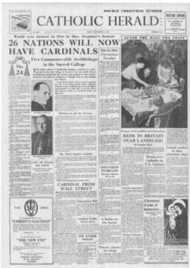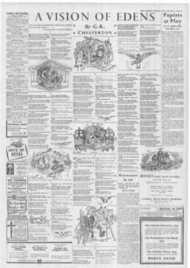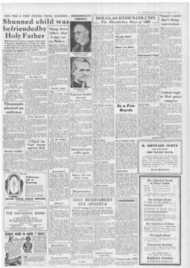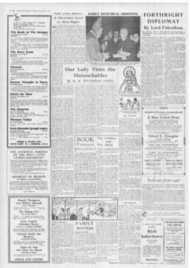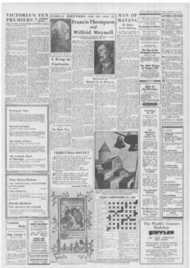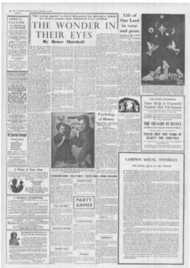Page 4, 5th December 1952
Page 4

Report an error
Noticed an error on this page?If you've noticed an error in this article please click here to report it.
Tags
Share
Related articles
A New Saint's Life Of Selfless Caring
Refugee Baby Is Baptised
Episcopal
Afternoon Midnight Mass
16th Child To Be Beatified
Fr. Riley, it seemed, was just the wrong type of
priest to tackle the problem of Paula Clay . . .
MIDNIGHT AT FOUR
ON the second Christmas Eve of the war Paula Clay found herself for the first time in fifteen years consulting the notices in the porch of a Catholic church. This fact did not imply any hankering after a return to the religion she had abandoned in her twenties. On the contrary, as her analyst had agreed when she told him her intention, it was a sign that she had at last achieved an adult attitude towards the faith of her youth.
Up to now Paula had been afraid to trust herself at Midnight Mass, Her unconscious might not have been proof against the onslaught of childhood associations to which it would certainly be subjected. The singing might have moved her to feelings that were not purely wsthetic; irrational longings for that other life which she now clearly understood to be wishful thinking might have surged up and with them the infantile sense of guilt from which she was in process of being delivered. But now, having survived three ordeals which her analyst told her might easily have upset he? newly integrated psyche, she felt she could risk it. If the successive deaths of her Catholic father and mother and the experience of being partially buried in her bombed home had not driven her back to the womb of the Church, she could surely survive a mere service. It would be an excellent tett, not only of her psyche but of the rational, though not bleak, philosophy with which she had replaced the old dogmatic creed.
AS she read the notice board and learnt that. owing to blackout and bombing, Mass would be celebrated at 4 p.m. instead of midnight, she could have thanked God, had she still believed in Him. that she was no longer one of the herd. They, poor wretches, had no choice but to accept the Christian myth as factual truth or to reject it as an insult to reason. She was now one of the privileged few who could see it as a magnificent poetic symbol. Now at last, uncontaminated by fear or desire, she would be able to appreciate it as she appreciated any work of art. Henceforth she would be able to enjoy Midnight Mass with the same pure, detached pleasure as a Greek tragedy or a Hindu religious dance.
Conscious of the great step forward she had made, she went into the church itself to savour her new freedom to the full. She hesitated a moment before deciding to genuflect. Then she reminded herself that, for hcr, it was merely a conventional gesture of courtesy like removing her shoes in a mosque.
The wintry morning light revealed the mass-produced ugliness of the plaster statues. There was nothing to stir the iesthetic imagination in St. Therese of Lisieux simpering over her cochineal pink roses or in St. Anthony staring fatuously at the plump chocolate-box child balanced precariously on his book. Though Paula was glad that she herself would never again drop a petition in the Little Flower's box or sixpence for the recovery of a lost object in St. Anthony's, she could be tolerant to those who did. There would always be people too weak to face the fact that there was no God and that the universe was indifferent to their needs. Why deprive them of their harmless magic?
AT the far end of the church some twenty people were kneeling in a group, obviously waiting for Confession. There were housewives with their shopping bags and gas-masks piled beside them; a few men. mostly old; some children who surely ought to have been evacuated; a couple of nurses and several withered, dowdy women of the unmistakable type the French call "grenouilles du benitier."
Paula surveyed the waiting group with amused contempt. This was an aspect of her former religion for which she could feel neither iesthetic appreciation nor tolerant pity. Alone of the sacraments, Penance had no beautiful outward symbols. Even one's first Confession was unaccompanied by any poetry of white veil or lighted candle. Certainly there was a profound urge to seek "forgive ness." But how could an impersonat formula. mumbled by a priest ignorant of the penitent's psychology, affect the unconscious impulses which caused the guilt? 1 he formula was not even supposed to work automatically; the onus was thrown back on the "dispositions" of the sinner. Instead of assuaging his guilt, Confession could just as easily increase it.
An old woman in a shabby coat and wool cap emerged from the box; a boy clattered noisily across the aisle to take her place. Overcome with sudden distaste for the church and the people in it, Paula wondered whether she would bother to return for the Mass. In any case, because of the war, it would probably be a hurried travesty of the Midnight Masses of her youth. Very likely even the singing would he "utility." Most of the men of the choir would have been called up and the boys evacuated, She shuddered at the thought of Adeste Fideles sung by an elderly alto or, horror of horrors, in the throbbing soprano of a "sacristy spinster." Better to keep her memories intact; to enjoy the essence of the old experience in imagination.
THERE was hardly a moment she I could not reconstruct from the hushed expectancy of the crowd waiting in the darkened church to the noisy jostle to the crib when the Mass was over. Sleepy, excited children; sedate parents; workmen; girls in evening dress who had come on from a dance; all would stare with the same dazed, happy expression at the china figures of Mary and Joseph and the shepherds; at the Holy Child dressed, like a doll, in a handembroidered robe. She had only to shut her eyes to conjure up the smell of musty straw that, more than tangerine peel, hot wax and scorching fir twigs, was the magical Christmas smell of her childhood. No, she would not return at four o'clock. She had accomplished her real purpose merely by entering the church and proving to herself that she was no longer swayed by the old loves and fears.
SHE was just going out when something compelled her to turn round again. Her movement was as involuntary as if someone had taken her by the shoulders and sharply faced her about. The next moment she was aware of an odd sensation at the nape of her neck as if an invisible hand were pressing on it. With her mind totally blank she felt herself being gently but strongly propelled towards the group waiting for Confession.
When she reached the end of the queue the pressure on her neck relaxed. Simply to recover from the shock, she dropped on her knees in the first vacant place. Trying to collect her wits, she stared at the head-scarf of the woman in front of her. Her presence in that queue was as incongruous as the two comic cats playing guitars which adorned the scarf.
She stood up to go just as another penitent came out of the box and there was a shuffle in the benches as the queue moved up. But once again she felt that peculiar pressure at the back of her neck, like the hand of an invisible policeman, and found herself following up to the next place.
This happened several times till at last she was among the first halfdozen and so hemmed in that she could not get out without causing a commotion. She decided to go on till she actually reached the first place and could then make her escape inconspicuously. The priest was dealing quickly with his clients; she would only be trapped for a few minutes more.
* *
DURING those minutes she was relieved to find that whatever compulsion had forced her into this absurd position had not affected her mind. She examined her conscience as carefully as if she had really been about to go to Confession, though for the opposite reason.
Had she any intention of returning to the Church? At the moment, none. She had left it originally because she was convinced that its assumptions were intellectually unjustified. Of course, if she were ever to be convinced again that they were true, honesty would demand her submission. But. as years of reading and discussing and thinking had only strengthened her conviction that there was no fool-proof argument for the existence of God, it seemed unlikely she would have to recant.
Did she repent of the extraordinarily untidy life she had led during the past fifteen years? Certainly, in many ways, she could have wished it otherwise. She had caused a great deal of trouble to herself and other people by what she now knew to be fixations in infantile patterns of behaviour. Now, released from this fixation after the three humiliating years of strict Freudian analysis she had undergone after her second attempt at suicide. repentance was an irrele vant word. One was not repentant for having had pneumonia: one was grateful for having recovered and determined to avoid future risks.
COMEONE nudged her in the ribs. ORealising she was now at the head of the queue. she had stood up to make her escape when she felt the pressure again.
A moment later she was kneeling in the dark box behind the closed door.
Panic seized her, but it was too late to retreat. "I he shutter behind the grill slid back. A tonsured head, a surplice and a stole were dimly visible behind the grating. A tired voice muttered something inaudible in Latin. Then, hardly more audibly, it asked: "How long since your last Confession?"
From sheer force of habit Paula whispered: "Fifteen years. But, Father, . . this is all a ghastly mistake. . . ."
Ignoring this, the tired voice persisted : "Yes. And since then you latsve committed . . . 7 Speak up a little. I can't hear you very well."
Paula raised her voice from a whisper to a low mutter and said desperately: "I got in here by accident. I must have had a mental blackout. I'm terribly sorry. You see, I'm not a Catholic."
"Are you a Protestant, then?"
"Oh, no. I used to be a Catholic."
The voice said briskly : "Al, ! A lapsed Catholic. That'll mean, to begin with, you've missed your Easter duties fifteen times. Or would it be only fourteen? What else, now?"
"But, Father . . . I'm sorry. I've not the least intention of going to Confession."
The voice said with a touch of sharpness: "Then what are you doing here in the confessional box?"
"I tell you . . . I don't know. That's what makes this so absurd and embarrassing. I'm horribly ashamed of myself. But truly it wasn't deliberate. Please forgive me."
Paula tried to struggle to her feet, but her legs refused to obey her.
The voice said : "It is for God to forgive you, not me."
"But I don't believe in God. Now do you understand, Father? 1 couldn't go to Confession."
"You don't believe in God? That's very extraordinary, now. We can't talk in here and there are others waiting. But you'd be doing me a great favour if you'd come and see me in the Priory at three o'clock. Just ask for Father Riley."
To save argument, Paula said that she would come if she could and telephone if she could not. At all costs she must get out of this ridiculous situation as quickly as possible.
This time she managed to make her escape. In her relief she almost ran down the aisle and out of the church, determined never to set foot in it again,
DROMPTLY at three o'clock Paula 1. Clay rang the bell of the Priory. l'his time no invisible hand had cornpelted her. Simply, in the interval, she 133 cI decided that it would be cowardly IC' cut the appointment. It would mean that she still had an unconscious fear of being drawn back. Here was a golden opportunity to test herself. She would meet this man face to face and courteously but firmly state her point of view. She knew in advance all the arguments he would use. Very calmly conceding all the beauties of his beliefs, admitting that for some people they were of immense practical value in helping them to deal with their frustrations, she would present her own view.
The door was opened by one of those typical priests' servants she remembered from the past : a shabby, rather deaf young man who seemed to be slightly mentally deficient.
"Did you say it was Father Riordan you was wanting?"
"No, Father Riley."
"Will it be about the Children of Mary? If so, Father Riordan says there'll not be a meeting next Sunday."
Eventually she was shown into a dreary parlour containing a hare table with two rush-bottomed chairs on either side. On the walls hung a spotty print of Pope Leo XIII, a crucifix, a holy-water stoup containing a dry piece of sponge, and a frayed stole slung over a nail.
‘11HEN Father Riley came in he V V was rather younger than she had supposed from his voice. Now that she saw him upright she realised that he was unusually tall, even allowing for the brown habit which added to his apparent height.
His face was neither ugly nor handsome : a short, blunt nose; a long upper lip; a pair of pleasant but not striking greyish-green eyes. It struck her as a face to which that dusty pallor was not natural. He had the big hands and feet of a peasant and he moved awkwardly as if his long robes hampered him. She could imagine him as a parish priest rushing about on a motor-bicycle or as an Army chaplain, hut not as a member of the semi-enclosed order to which he belonged. A misfit, she thought. She wondered what series of psychological frustrations had brought him to it. Unlike most of the priests she remembered, it was not impossible to think of him as a married man with a family.
As soon as he began to talk she could not help finding something likeable about him. She was trying to put, as politely as possible, some of her reasons for having left the Church when he groaned and ran his hands through the thick hair round his tonsure.
"There . . . it's just as I feared. You're one of these clever people. I never was any good at argument. It's Father Riordan you should have seen. He's a whale at theology and philosophy. But I'm the fool of the community."
Paula said truthfully : "I'm sure I'd much rather see you."
He shook his head disconsolately. "Father Riordan would put it all as clear as daylight. He's got all the proofs on the tip of his tongue. Oh, you'd have to be a very clever lady indeed—or a very obstinate one—to stand up to Father Riordan. I know I can't."
"He sounds rather alarming."
"He is that, But a heart of gold, you understand. That's what I keep reminding myself when I come up against Father Riordan and he shows me up for the stupid fellow I am. There are times when I wonder what I'm doing in a learned community like this. But my sister . . . she's a Little Sister of the Poor . . she says 'Stuff and nonsense, Joe; God can write straight with a crooked pencil.' " He looked at Paula with puzzled eyes. ''But of course you don't believe in God. That's a most extraordinary thing, now. I wonder how does it feel?"
She asked boldly: "Have you never doubted for a moment?"
"No. It's just never occurred to me to doubt His existence any more than my own. Oh. I've been angry with God. Yes. and I've complained at His ways. I've even gone so far as wishing He didn't exist or would leave a poor chap alone."
Paula risked saying: "But there's no real proof. . . ."
"Sure and there is. And more than one. But I'm shamed to admit I can't remember them now, though they dinned them into me in the seminary. Isn't that me all over? Here's my grand chance to pull you in again with a fine string of reasons and not one can I get out. I only know that I love ... or try to love . • . God and serve Him."
PAULA could not speak. Something seemed to turn upside-down in her breast. After a moment Father Riley said despondently:,
"Well, it was good of You to come. You'll feel it's been a great waste of time. There's no hope. 1 suppose, that you'd come back some day and have a word with Father Riordan?"
"No. I'm afraid not." She stood up and held out her hand, smiling. "It's your time I've wasted. I'm sorry."
"Ah. don't speak of it. My time's of no consequence."
He smiled, too, revealing strong,
yellow teeth, but the grey-green eyes were profoundly sad. "I can't reason with you. But you can't stop me praying for you."
Paula withdrew her hand from his. She said abruptly : "Thank you. I'll go now. I'm sorry about all this. I'm not quite myself at the moment. Tomorrow I'll be quite normal again. Good-bye."
HE did not answer, but stood with his empty hand outstretched, detaining her with the strangest look. His eyes were no longer clouded with disappointment but bright and penetrating. She met the look firmly at first, then with such a growing sense that she was being searched by something far more powerful than the eyes of a simple, kindly priest that she had to drop her own. She felt she was not merely being searched; something was offering itself to her with such finality for acceptance or rejection that she wanted to turn her face away as if from a light so bright that it scorched. Instead, she made the faintest inclination of her head.
Suddenly the priest mined away and, reaching up, pulled the frayed stole off its nail. He said drily : "I can't hear your Confession in the parlour. Will you come into the church, please?"
AQUARTER of an hour later he accompanied her to the porch. As he stood on the steps, there was such tranquil joy in his face that Paula wondered how she could have had that sharp first impression of a misfit.
"I'll tell you something," he said with a smile. "You're in the nature of a Christmas present to me. A rather special one. too."
She asked what he meant.
"It was this way. I've been on had terms with God . . oh, for many weeks now. I'd been wondering if maybe I'd mistaken my vocation and was just a square peg in a round hole. It got so had that at fast I asked God . . . and none too courteously either
. . for a sign. I said to Him: 'If you want me to stay on in this community where I'm always causing scandal to the brothers by my ignorance and my clumsiness and the rest. just send me a sinner for Christmas.'"
blog comments powered by Disqus


